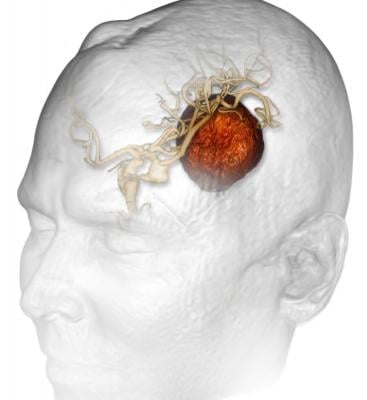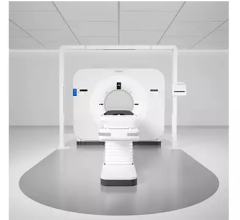
February 29, 2016 — Radiotherapy effectively damages brain tumors but the cancer cells can repair themselves in order to live on. Now, researchers at Sidney Kimmel Cancer Center have tested a strategy that combines radiotherapy with a drug that shuts down the ability of tumors to mend themselves.
Researchers say their 12-patient study, published January 29 online ahead of print in the Journal of Neuro-Oncology, offers enough promise that a more comprehensive, phase 2 clinical trial should be conducted to test the combination therapy for aggressive, recurrent brain cancer.
“We saw synergy between radiotherapy and the agent, panobinostat. Our findings suggest panobinostat makes radiotherapy much more effective,” said the study’s senior author, Yaacov R. Lawrence, M.D., of the Department of Radiation Oncology at Thomas Jefferson University’s Sidney Kimmel Medical College.
All 12 patients tested had high-grade gliomas that had recurred after initial radiotherapy. Eight patients had recurrent glioblastoma, and four had recurrent anaplastic astrocytoma. These two forms of aggressive brain cancer represent almost 70 percent of newly diagnosed gliomas, which are diagnosed in about 10,000 patients annually. Despite response to initial radiation, most patients relapse within two years and overall survival is then limited to a year or less.
“There is no standard treatment for recurrent high-grade gliomas. At Jefferson, we have a lot of experience with offering a second course of radiation after a patient relapses, in order to increase survival, but we are excited by the promise of a targeted agent that makes initial and repeat radiotherapy more effective,” said co-author Adam Dicker, M.D., Ph.D., FASTRO, chair and professor of radiation oncology, pharmacology and experimental therapeutics at the Sidney Kimmel Medical College.
Panobinostat, approved for use in 2015 for treatment of multiple myeloma, is being tested in a variety of other cancers. It is a histone deacetylase inhibitor that has been shown to modify expression of about 8 percent of RNA molecules produced from genes. Modifying RNA changes protein production, unsetting cancer growth. The drug also turns off RAD51, a DNA repair enzyme, Dicker said.
Researchers found that the highest dose of panobinostat tested in patients was well tolerated, and they observed improved progression-free survival and overall survival.
“The intent of this study was not to demonstrate benefit of the combination therapy, but to test safety. Still, we did note promising activity, which must be validated in further studies,” Lawrence said.
Co-authors all represent Thomas Jefferson University and include first author Wenyin Shi, M.D., Ph.D.; Joshua D. Palmer, M.D.; Maria Werner-Wasik, M.D.; David W. Andrews, M.D.; James J. Evans, M.D.; Jon Glass, M.D.; Lyndon Kim, M.D.; Voichita Bad-Ad, M.D.; Kevin Judy, M.D.; Christopher Farrell, M.D.; Nicole Simone, M.D.; and Haisong Liu, Ph.D.
The study was funded by Novartis, which developed panobinostat. This funding was to the Sidney Kimmel Cancer Center. No author reports a conflict of interest.
For more information: www.springer.com/medicine/internal/journal/11060


 December 11, 2025
December 11, 2025 









